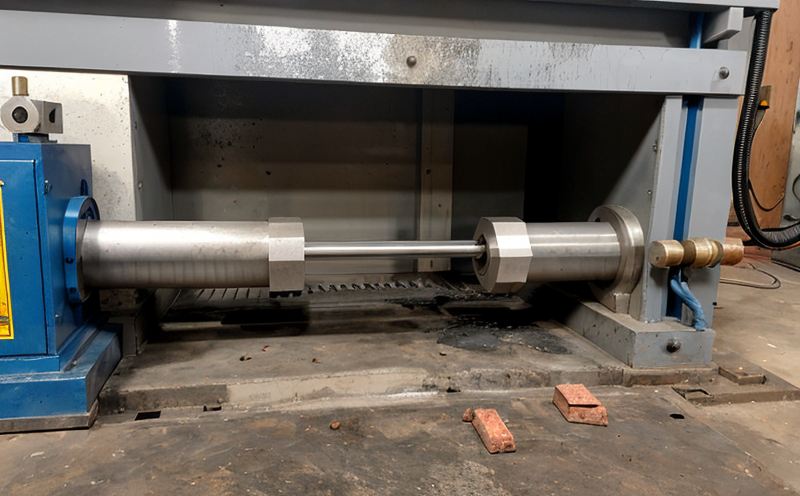ASTM D4060 Taber Abrasion Testing
The American Society for Testing and Materials (ASTM) D4060 standard specifies a method for determining the resistance of materials to abrasion using the Taber Abraser. This test is particularly useful in industries where surface durability is critical, such as metallurgy, material science, and manufacturing.
The Taber Abrasion Test measures how well a material withstands wear from frictional contact with an abrasive wheel. The standard provides detailed guidance on specimen preparation, testing procedures, and reporting results. The test involves subjecting the specimen to repeated impacts or sliding motions using a rotating wheel that simulates real-world abrasion conditions.
The ASTM D4060 method is widely recognized for its accuracy in assessing the abrasion resistance of various materials, including metals, ceramics, plastics, and composites. Understanding material wear behavior is essential for optimizing product design, ensuring compliance with industry standards, and enhancing longevity in applications such as industrial coatings, automotive parts, and construction materials.
The test setup typically includes a Taber Abraser machine, which applies controlled pressure and speed to the specimen. The abrasion resistance is measured by tracking the weight loss of the specimen or the thickness reduction after a predetermined number of cycles. This allows for quantitative evaluation of material performance under simulated wear conditions.
Compliance with ASTM D4060 can be critical in industries where product longevity and reliability are paramount. For instance, automotive manufacturers may use this test to ensure that their coatings meet durability standards, while construction companies might rely on the results to select materials for high-wear applications like road surfaces or building facades.
The Taber Abrasion Test is not only a valuable tool in quality assurance but also aids in research and development. Engineers can utilize the results to refine material compositions, improve coating adhesion, or enhance surface finishes. By adhering to ASTM D4060 standards, manufacturers ensure consistent product performance across different environments and applications.
One of the key benefits of this testing method is its ability to provide a standardized approach to evaluating abrasion resistance. This standardization ensures that results are comparable across various laboratories and industries, facilitating better decision-making in material selection and process optimization.
- Specimen Preparation: Specimens must be prepared according to the ASTM D4060 specifications, ensuring they represent the intended use conditions.
- Maintenance of Equipment: Regular calibration of the Taber Abraser ensures accurate testing results.
- Data Analysis: Comprehensive analysis of abrasion data helps in identifying areas for improvement and optimizing product design.
In summary, ASTM D4060 Taber Abrasion Testing is a robust method for assessing materials' resistance to wear. By adhering to this standard, industries can ensure consistent quality, meet regulatory requirements, and enhance the performance of their products in real-world applications.
Why It Matters
The abrasion resistance of materials is a critical factor in many industrial applications where surfaces are exposed to frictional contact. In metallurgy and material testing, understanding how materials behave under abrasive conditions can significantly impact product design, performance, and durability.
Abrasion resistance is particularly important in sectors such as automotive, aerospace, construction, and consumer goods, where materials must withstand harsh environments or high-use applications. For instance, in the automotive industry, coatings on exterior surfaces need to resist abrasion from environmental factors like sunlight, rain, and road salt. Similarly, industrial equipment components exposed to abrasive environments require robust surface finishes to enhance longevity.
The ASTM D4060 Taber Abrasion Test provides a standardized method for evaluating materials' resistance to abrasion, ensuring that the results are consistent and comparable across different laboratories and industries. This consistency is essential for quality assurance, compliance with international standards, and the development of reliable products.
By conducting this test, manufacturers can identify potential weaknesses in their materials or coatings, allowing them to make informed decisions about material selection, process optimization, and product design. The insights gained from ASTM D4060 testing can lead to improved performance, reduced maintenance costs, and enhanced customer satisfaction.
In addition to its role in quality assurance and R&D, the Taber Abrasion Test is also valuable for compliance purposes. Many industries have specific requirements regarding material durability, and adherence to standards like ASTM D4060 ensures that products meet these regulatory expectations. This can help manufacturers avoid costly penalties and reputation damage associated with non-compliance.
Overall, the importance of ASTM D4060 Taber Abrasion Testing cannot be overstated. It provides a reliable method for evaluating materials' resistance to abrasion, ensuring consistent quality, compliance, and reliability in industrial applications.
Eurolab Advantages
At Eurolab, we offer comprehensive ASTM D4060 Taber Abrasion Testing services that are tailored to meet the needs of our clients. Our expertise in metallurgy and material testing ensures that our tests are accurate, reliable, and compliant with international standards.
We employ state-of-the-art equipment and skilled technicians who adhere strictly to ASTM D4060 specifications. This guarantees consistent and repeatable test results, which are crucial for quality assurance and product development.
Our laboratories are equipped with the latest technology and instrumentation necessary for conducting accurate Taber Abrasion Tests. We use high-quality abrasive wheels and precise control over testing parameters such as pressure, speed, and number of cycles. This ensures that our tests simulate real-world conditions accurately.
In addition to providing accurate test results, Eurolab offers detailed reports that include a comprehensive analysis of the abrasion data. Our reports not only present quantitative results but also provide insights into areas for improvement and recommendations for optimizing product design and performance.
Our commitment to excellence extends beyond just the testing process. We ensure that our clients have access to expert advice and support throughout their projects, helping them make informed decisions about material selection and process optimization.
By choosing Eurolab for your ASTM D4060 Taber Abrasion Testing needs, you can be confident in the quality and reliability of our services. Our experienced team will work closely with you to ensure that your tests are conducted efficiently and effectively, delivering results that meet or exceed industry standards.





